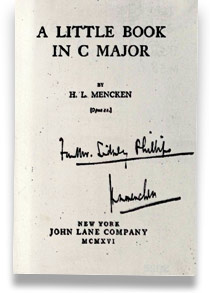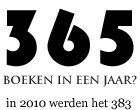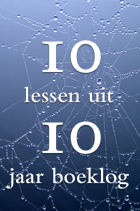Little Book in C Major ~ H.L. Mencken
De Library of America heeft aangekondigd de boeken van H.L. Mencken [1880 – 1956] te zullen heruitgeven. Dat is enerzijds goed nieuws, want die mooi uitgegeven en dikke verzamelbundels zijn al na korte tijd voor vijftien dollar te koop. Maar anderzijds staat er al heel wat van Mencken online, omdat die titels oud genoeg zijn om tot het publieke domein te horen. Het nogal wisselende niveau daarvan relativeert meteen de vreugde over de mogelijke heruitgave.

Onder de teksten online is de aforismenbundel A Little Book in C Major, uit 1916, die ik las in facsimile. Het boek viel me niet mee.
Wel geldt dat de beste uitspraken uit deze bundel in elk geval Mencken’s hele leven standhielden; en ook lang nog daarna door velen zijn aangehaald. Websites maken er nog altijd goede pronk mee. Ook de mijne.
Maar dit boek las eerder als een schetsboek dan een zelfstandige uitgave. Mencken komt telkens op dezelfde onderwerpen terug, en ook de best gelukte uitspraken worden dan slechts wijsneuzige variaties op een thema. Een thema dat gaat vervelen, bovendien.
Weliswaar sprak H.L. Mencken briljant tegen misogyn te zijn:
A misogynist is a man who hates women as much as women hate one another [VI, 41]
Maar er staan te veel soortgelijke uitspraken tegen vrouwen, of het huwelijk in het boek, om dat onderwerp niet tot een vervelend stokpaardje te maken.
Bijvoorbeeld.

Men have a much better time of it than woman. For one thing, they marry later. For another thing, they die earlier. [I, 24]

Democracy is the theory that the common people know what they want, and deserve to get it good and hard. [II, 1]

An idealist is one who, on noticing that a rose smells better than a cabbage, concludes that it is also more nourishing. [II, 3]

The truth that survives is simply the lie that is pleasant to believe. [II, 11]

Conscience makes cowards of us all. Politeness is even worse. It makes actors of us. [II, 26]

A lawyer is one who protects you against robbers by taking away the temptation. [IV, 6]

Conscience: the inner voice which warns us that someone may be looking. [IV, 12]

A poet is usually a bad critic of his own work. And a critic is often worse. [V, 8]

The chief knowledge that a man gets from reading books is the knowledge that very few are worth reading. [V, 10]

In the main, there are two sorts of books: those that non one reads and those that no one ought to read. [VII, 5]

Theology is an effort to explain the unknowable by putting it into terms of the not worth knowing. [VII, 11]

An historian is an unsuccessful novelist. [VII, 21]



















 RSS feeds
RSS feeds